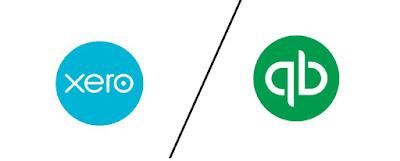Are you a small business owner looking for the perfect accounting software to streamline your financial processes? Look no further – we've got you covered! In this ultimate comparison, we will dive into the world of Xero and QuickBooks, two of the most popular accounting software options on the market. Whether you're a startup entrepreneur or an established business owner, finding the right accounting solution is crucial for your success. So, let's get ready to explore the features, pros and cons, and ultimately decide which one reigns supreme in the battle of Xero vs QuickBooks. Get ready to level up your financial game with our comprehensive guide!

Xero vs QuickBooks
Comparison Xero vs QuickBooks
Xero vs QuickBooks are both powerful accounting software options that cater to the needs of small businesses. While they share similar goals, there are some key differences between the two.
Let's talk about user interface and ease of use. Xero boasts a sleek and intuitive design that is easy for even non-accountants to navigate. Its dashboard provides a clear overview of your financials, making it simple to track income and expenses. On the other hand, QuickBooks has a more traditional layout with tabs and menus. It may take some time for new users to get accustomed to its interface, but once you do, it offers robust functionality.
In terms of pricing plans, Xero offers multiple tiers based on business size and needs. It starts with an affordable plan for freelancers or solopreneurs and scales up as your business grows. QuickBooks also offers different plans depending on your requirements but tends to be slightly more expensive than Xero.
When it comes to integrations with third-party apps or services, both Xero and QuickBooks excel in this area. They have extensive app marketplaces where you can find integrations for various purposes like inventory management or payroll processing.
One significant advantage that sets Xero apart from QuickBooks is its unlimited users feature at no extra cost in all pricing plans except the entry-level one. This makes collaboration among team members seamless without worrying about additional charges.
Choosing between Xero vs QuickBooks depends on your specific business requirements – budget constraints, desired features, scalability potential – these factors should guide your decision-making process.
Stay tuned as we dive deeper into each platform's pros and cons next!
Xero vs QuickBooks Overview
Xero and QuickBooks are two leading accounting software options in the market, each with its own set of features and benefits. Let's take a closer look at their respective overviews to help you make an informed decision.
Xero is a cloud-based accounting solution that allows small businesses to manage their finances easily. It offers a user-friendly interface and enables users to access their data from any device with an internet connection. Xero also provides various tools for invoicing, bank reconciliation, inventory management, and financial reporting.
On the other hand, QuickBooks is another popular choice among businesses for its comprehensive range of features. It offers both desktop and online versions, allowing users to choose based on their needs. QuickBooks provides functionalities like invoicing, expense tracking, payroll management, tax preparation, and more.
Both Xero and QuickBooks offer integrations with third-party applications such as payment gateways or CRM systems to enhance productivity. Additionally, they provide robust security measures to protect your financial information.
Choosing between Xero and QuickBooks depends on your specific business requirements and preferences. Consider factors like budget constraints, scalability needs, industry-specific features needed before making your decision.
Note,
To determine which option suits you better - whether it's Xero or QuickBooks - it's essential to evaluate each platform's strengths against your business needs. Take advantage of free trials or demos offered by both providers so that you can experience firsthand how they work for you.
The Pros And Cons Of Xero vs QuickBooks
When it comes to comparing Xero vs QuickBooks, both accounting software platforms have their own set of pros and cons. Let's take a closer look at what each has to offer.
Starting with Xero, one of its major strengths is its user-friendly interface. The platform is known for its clean and intuitive design, making it easy for even the least tech-savvy individuals to navigate. Additionally, Xero offers excellent invoicing capabilities, allowing users to create professional-looking invoices in just a few clicks.
Another advantage of Xero is its strong mobile app functionality. With the ability to access your financial data on the go, you can stay updated on your business finances no matter where you are. This flexibility is particularly beneficial for busy entrepreneurs who are constantly on the move.
On the downside, some users find that Xero lacks certain advanced features compared to QuickBooks. For instance, inventory management may not be as robust in Xero as it is in QuickBooks. Additionally, while Xero does offer payroll functionality through integrations with third-party providers, it doesn't have a built-in payroll system like QuickBooks does.
Turning our attention to QuickBooks, this software also has several notable advantages. First and foremost is its extensive feature set—QuickBooks offers a wide range of tools that cater specifically to small businesses' accounting needs. From expense tracking and bill payments to inventory management and tax preparation, QuickBooks covers all bases.
Another strength of QuickBooks lies in its reporting capabilities. The platform provides an array of customizable reports that give users valuable insights into their financial health and performance metrics. These reports can help businesses make informed decisions based on accurate data analysis.
However), some users find that navigating through all those features can be overwhelming initially). Especially for beginners or those without prior accounting knowledge). Moreover,), while many appreciate the depth of options available,), others feel that these complexities can lead)to a steeper learning curve).
In the end, when deciding between Xero and QuickBooks, it ultimately comes down to your specific accounting needs and preferences. Both platforms offer their own unique advantages, so it's important to evaluate what features are most important for your business and then select the platform that best suits you.
Which Is Better For Accounting - Xero vs QuickBooks
When it comes to accounting software, choosing the right one for your business is crucial. Two popular options in the market are Xero and QuickBooks. Both platforms offer a range of features that can simplify your accounting processes and help you stay on top of your finances. However, determining which one is better suited for your needs requires a closer look at their individual strengths and weaknesses.
Xero has gained popularity among small businesses due to its ease of use and intuitive interface. It offers strong invoicing capabilities, making it easy to create professional-looking invoices and track payments. Additionally, Xero integrates seamlessly with various third-party apps, allowing you to expand its functionality as needed.
On the other hand, QuickBooks provides robust reporting features that give you deep insights into your financial data. It also offers more advanced inventory management tools compared to Xero. Furthermore, QuickBooks is widely used by accountants and bookkeepers, making it easier to collaborate with professionals if needed.
The decision between Xero vs QuickBooks depends on factors such as the size of your business, specific accounting needs, budget constraints, and personal preferences. Take some time to evaluate these factors before making a choice.
Remember that what works best for one business may not necessarily work for another. Therefore it's important to consider all aspects carefully before deciding which accounting software solution will be most beneficial for you.
Conclusion
After carefully comparing Xero vs QuickBooks, it is clear that both accounting software options have their own strengths and weaknesses. The best choice for your business will depend on your specific needs and preferences.
Xero offers a user-friendly interface, strong invoicing capabilities, and seamless integration with third-party apps. It is particularly suited for small to medium-sized businesses that value ease of use and collaboration features. Additionally, Xero's pricing plans are flexible, allowing you to choose the option that fits your budget.
On the other hand, QuickBooks provides robust features for all aspects of accounting including inventory management and payroll processing. It has been around longer than Xero and has built a solid reputation in the industry. QuickBooks may be more suitable for larger businesses or those with complex accounting requirements.
When choosing between Xero vs QuickBooks, it is important to consider factors such as your company size, industry-specific needs, budget constraints, and personal preference. Both software options offer powerful tools to streamline your financial processes; it’s just a matter of finding the one that aligns with your unique business requirements.
Before making a final decision on which platform to choose from - whether it’s Xero or QuickBooks - take advantage of free trials offered by both providers. This will give you an opportunity to explore each system firsthand before committing.
Remember, transitioning from one accounting software to another can be time-consuming and disruptive for your business operations. So make sure you thoroughly evaluate all available options before making a switch.
In conclusion (without using "in conclusion"), do thorough research on both platforms' features , read customer reviews about user experiences , consult with professionals if necessary – ultimately find out which product would suit YOUR BUSINESS NEEDS THE BEST!

